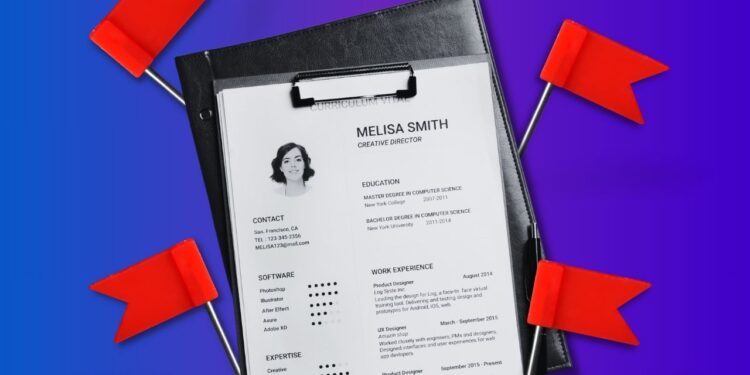- In the fiercely competitive job market of 2024, standing out is not just a goal—it’s a necessity. But you don’t want to stand out for the wrong reasons.
- Resume Genius’s latest guide illuminates the top nine resume red flags that could signal trouble to potential employers.
- In the evolving job market, it’s essential that applicants learn how to properly navigate the use of AI in crafting applications.
In the fiercely competitive job market of 2024, standing out is not just a goal—it’s a necessity. The key is to stand out as a star candidate, though, not as an application full of red flags.
The landscape of employment continues to shift under the influence of technological advancements and changing industry norms, and job seekers are trying new strategies in the face of new challenges to present themselves as the ideal candidate.
Before you overhaul your resume in an attempt to energize your job search this new year, make sure you’re not adding red flags.
treacherous, so going in well informed is Enter Resume Genius’s latest guide: a beacon for those navigating the treacherous waters of resume preparation.
Backed by advice from top HR and career experts, Resume Genius released a guide on the worst resume red flags. Here are the top red flags job seekers need to avoid signaling to employers:
The top nine worst resume red flags:
- Generic AI-generated content
- Lengthy employment gaps
- Excessive job hopping
- Listing out too many irrelevant jobs
- Oversharing personal information
- Lies and embellishments
- Careless mistakes
- Noticeable contradictions
- Poor formatting and design
“The ‘9 Worst Resume Red Flags of 2024’ — as identified in our recent analysis — don’t always automatically disqualify job seekers, but they do indicate areas that warrant careful consideration,” Resume Genius Career Expert Eva Chan told Allwork.Space. “Some of these issues, like typos and grammatical errors, are well-known. However, other red flags have popped up in recent months and years due to the increasing ubiquity of AI technology and evolving workplace trends.”
In the evolving job market of 2024, applicants must navigate the use of AI in crafting applications with care. While AI tools like ChatGPT offer efficiency, they can also produce generic content that may undermine the personal effort in a job application, according to Chan.
Explaining employment gaps has become less taboo, yet it demands a personal touch that AI cannot fully replicate. Consistency across online professional profiles is also crucial; a unified personal brand across platforms like LinkedIn reinforces credibility.
Despite a growing acceptance of job hopping, candidates should still articulate their work history thoughtfully to demonstrate commitment and stability to potential employers.
“Overloading a resume with irrelevant jobs can obscure key qualifications, and oversharing personal information can lead to bias and privacy issues,” Chan told Allwork.Space. “Lastly, the importance of error-free and well-formatted resumes cannot be overstated, as they reflect a candidate’s professionalism and attention to detail.”
Red flags such as employment gaps or frequent job changes can trigger concerns about your reliability and fit for the role. To mitigate these concerns, proactively address any issues by weaving a narrative that explains these red flags while highlighting your strengths and readiness to excel in the new role.
Crafting a standout resume requires more than just listing skills and experiences; it demands a strategic presentation that aligns with the employer’s culture and needs.
By doing so, job seekers can transform potential weaknesses into opportunities to demonstrate resilience and adaptability, thereby positioning themselves as an attractive candidate who is both honest and capable of making a positive impact in the workplace.
















